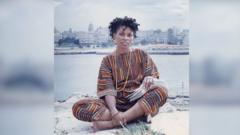World
Watch: How Trump and Comey’s relationship soured

Breaking News
Dating app sex assault victim urges others to seek immediate help
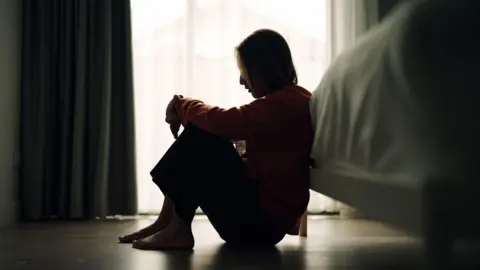
Read more on post.
Kevin SharkeyBBC News NI
A student who was sexually assaulted after meeting a man on a dating app has appealed to other survivors to seek immediate help to ensure there’s a record of the abuse.
The woman, who was 20 at the time, was attacked during a short-term relationship after she moved to Belfast to begin her university studies.
Last year, 25-year-old Fearghall Joseph Mulgrew, of Mullaghmoyle Road in Stewartstown, County Tyrone was jailed after pleading guilty to sexually and physically assaulting the woman.
Sophie, not her real name, believes her attendance at a sexual assault referral centre afterwards was crucial to the prosecution.
- Warning: Some readers may find parts of this article distressing
A judge at Belfast Crown Court said Mulgrew subjected the woman to a “degrading and frightening” experience, and he used her “as a sexual toy whose personal integrity and feelings were entirely subservient to your sexual desires”.
He was given a 22-month sentence in April 2024, serving 14 months on licence.
The court was told Mulgrew was a student in Belfast when he initially met the woman on the dating app Tinder in March 2021.
They agreed that the woman would come to his accommodation for “rough” intercourse at 03:00 GMT.
The woman said it was not something she had done before, but she agreed to try it, and the pair had consensual sex.
‘He wanted to do things his way’
The victim, who wishes to remain anonymous, has now spoken about her ordeal and explained that they had been in a casual relationship for about a month.
“The day of the incident he’d made it clear that he wanted to do things his way which included rough sexual contact. I hadn’t quite expected it to be what it was,” she told BBC News NI.
“He bit me, you know, in intimate areas where I had to kick him to get him off, to get him to stop, and even though we had a safe word he made it very obvious that that wasn’t even going to work, and he held my mouth closed with his teeth so I couldn’t say anything.
“That’s what sticks with me the most, the biting, it was all over my face.”
Reporting to police
Sophie, who has since left Northern Ireland, went to the Rowan sexual assault referral centre for help soon afterwards but she did not report the incident to the police until almost a year later.
She now believes her attendance at the centre was crucial to the subsequent prosecution of her abuser.
“I would advise that, even if you don’t know, because sometimes you can be so confused and so in shock that you don’t know but you think, then just get yourself looked at.
“For me, if I hadn’t gone to the Rowan, me reporting to the police would have been 100% more difficult. They wouldn’t have had my statement from the time, they wouldn’t have had photographs, and they wouldn’t have had all the swabs and things that they took.
“That evidence is invaluable especially if you are going into court,” she said.
 Reuters
ReutersHow are police tackling violence against women?
It has been three years since the Police Service of Northern Ireland (PSNI) launched an action plan to tackle violence against women and girls (VAWG).
The PSNI said it had made 5,042 arrests by the end of August 2025 under new legislation and conducted hundreds of targeted patrols.
They said they have also put in place four stalking protection orders using the new laws.
Each month, 84 arrests have been made on average for domestic abuse, there have been an average of 19 arrests each month for the offences of stalking, threatening and abusive behaviour, and 76 arrests each month for non-fatal strangulation.
In the 12 months to July 2025 there were 21,729 violence against women and girls (VAWG) offences recorded – a reduction of 4% compared to the previous 12 months.
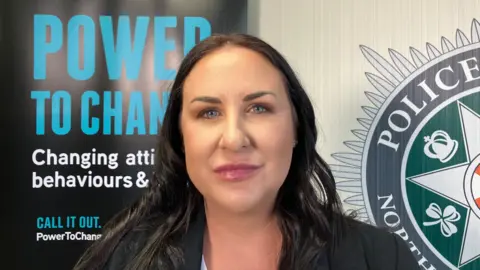
Det Ch Insp Leah Crothers, one of the PSNI’s tackling VAWG leads, said they “remain committed to doing everything” they can to prevent harm and call out unacceptable attitudes and behaviours.
“We have always been clear that it will take a societal effort to make a real change,” she added.
“Tackling violence against women and girls requires commitment from all — where perpetrators are held to account, communities stand together, and we work with partners to make every space safe. This remains our goal.”
Sophie said “too many men had blurred lines of consent and a misogynistic view on life”.
“I and so many other young women have suffered because of this. I am standing up to say it is not right and the only way to put a stop to it is to educate men and boys and for women like me to feel supported enough to report.”
If you are affected by domestic abuse, there is a range of support services available via the BBC’s Action Line page.
Breaking News
‘My labour went on for 85 hours – now I know why’

Read more on post.
Jenny ReesWales health correspondent
When Lana Boocock gave birth to her first child, the labour lasted for a gruelling 85 hours.
Her baby then needed to spend time in neonatal intensive care.
Ms Boocock, now a mum-of-two, said difficulties giving birth to both of her children became easier to understand when she was later diagnosed with adenomyosis, a condition which is believed to affect more than one in 10 women.
Pregnant women with adenomyosis are at a greater risk of complications during labour, according to consultant gynaecologist Anthony Griffiths, but the risks are not managed because it remains under-diagnosed.
“It’s remarkably common, it’s just we’re not looking for it,” said Mr Griffiths.
Adenomyosis is a condition where the lining of the womb starts growing into the muscle in the wall of the womb.
It can cause painful periods, heavy bleeding, pelvic pain and pain during sex.
Dr Griffiths said pregnant women with adenomyosis also had a much higher rate of miscarriage, premature births and issues like pre-eclampsia, but that risks could be well managed with increased monitoring by healthcare professionals.
“What I’ve learned is that [during labour] your uterus fails to contract properly and you have a failure to progress with labour – and that, to me, is exactly what happened,” said Ms Boocock, 30, from Caerphilly.
“It just makes me upset to think of how many women have gone through labour and had worse outcomes than me, because of these complications.”
‘It was ruining my life’
Prior to her diagnosis, Ms Boocock – who also has endometriosis – had lived with debilitating symptoms that left her regularly needing to use a walking stick.
“I was haemorrhaging every couple of weeks, my iron levels were critically low and I had no energy to do anything,” she said.
The pain was centred in her hip and initially coincided with her menstrual cycle, but developed to be a constant, agonising problem.
She said after years of medical appointments and being told it was “just part of being a woman”, “probably IBS” or repeatedly being prescribed birth control, she paid for a hysterectomy, retaining her ovaries.
“At some points when I was so poorly before my surgery, I was suicidal. I was in so much pain it was ruining my life.
“But when I finally got to see an NHS gynaecologist and asked to be put on the list for a hysterectomy, the consultant’s words were: ‘You’re too young, you’ll lose your fertility’.
“But I didn’t want my fertility, I wanted my quality of life.”
A hysterectomy will remove symptoms of adenomyosis, though it is not a cure for endometriosis.
However, Ms Boocock said three months on from her surgery life was “just fantastic”.
“I would love these diseases to be taken more seriously,” she said.
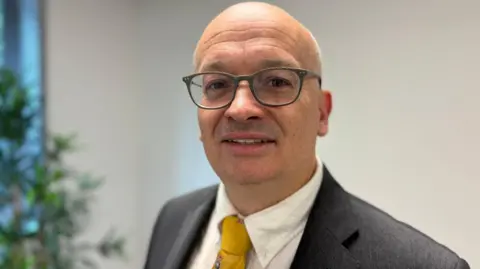
Mr Griffiths said medical textbooks from a decade ago defined adenomyosis as a “disease of ladies in their 40s” with heavy vaginal bleeding that was not easily controlled with medication.
“But that’s not true at all,” he said. “That’s a myth, mainly because we didn’t have tools to diagnose it.”
He said high quality MRIs were now detecting the condition in much younger women, and that around a third of the women he saw with endometriosis had some adenomyosis.
“Adenomyosis and endometriosis are different diseases, but there are similarities – people can present with heavy periods, agonizing pain often with periods but it can be throughout the menstrual cycle.”
Dee Montague-Coast, from the charity Fair Treatment for the Women of Wales – which chairs the women’s health Wales coalition – said there were more than 158,000 people living with adenomyosis in Wales.
“Yet in our experience, people won’t have heard of it before,” she said. “Often their healthcare professionals haven’t heard of it either.”
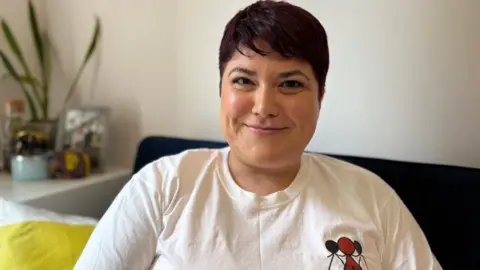
She explained that adenomyosis was only recently included on the NHS 111 website, following a petition by the charity.
“If people can’t find information on it, that harms patients, it contributes to diagnostic delays, but also harms healthcare professionals looking for this information.”
Mr Griffiths said treatment options for both adenomyosis and endometriosis had improved but there was limited diagnostic capability within the NHS.
“There’s obviously financial constraints everywhere, but unless you recognise there’s a problem – and a significant problem – you’re not going to allocate healthcare,” he said.
“We know it ruins lives. There’s high suicide within this bracket of people because they’ve got agonising, intractable symptoms, and yet are unable to get help.”
‘54,000 women waiting for care’
A spokesperson from the Royal College of Obstetricians and Gynaecologists (RCOG) said: “The relationship between adenomyosis and pregnancy outcomes is complex, and current research remains limited and inconclusive. More investment is needed in research to understand its potential impact on fertility, miscarriage, and premature birth.
“At the same time, urgent action is required to reduce gynaecology waiting lists, with over 54,000 women in Wales currently waiting for care for conditions such as adenomyosis – conditions that can have a severe impact on quality of life.
“We welcome the Welsh government’s recognition of adenomyosis in the Women’s Health Plan. However, women’s health continues to be chronically underfunded.
“The RCOG is calling on governments to prioritise investment in research, diagnostics, and treatments so that women affected by adenomyosis and similar conditions can access the care and answers they deserve.”
The Welsh Government said endometriosis and adenomyosis was “one of the eight priority areas in the Women’s Health Plan for Wales which outlines how we are determined to improve women’s health services and women’s experience of those services”.
“Funding of £3m is being used to deliver the actions in the plan, with a specific focus on establishing a Women’s Health Hub in every health board by March 2026, as well as supporting timely diagnosis and management of conditions including adenomyosis.”
If you have been affected by the issues raised in this story, information and support can be found via the BBC’s Action Line website.
-
Culture3 weeks ago
Life, loss, fame & family – the IFI Documentary Festival in focus
-
Politics4 days ago
European Parliament snubs Orbán with vote to shield Italian MEP from Hungarian arrest
-
Environment7 days ago
Key oceans treaty crosses threshold to come into force
-
Health4 days ago
EU renews support for WHO’s Universal Health Coverage Partnership
-
Culture2 months ago
Fatal, flashy and indecent – the movies of Adrian Lyne revisited
-
Culture4 days ago
Twilight at 20: the many afterlives of Stephenie Meyer’s vampires
-
Culture1 week ago
Farewell, Sundance – how Robert Redford changed cinema forever
-
Culture4 weeks ago
What is KPop Demon Hunters, and why is everyone talking about it?



